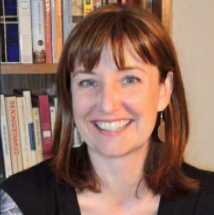A Midland University professor whose own life has been touched by disability recently published her first book, Disability, Faith, and the Church: Inclusion and Accommodation in Contemporary Congregations.

Published by Praeger, the book by Dr. Courtney Wilder, Professor of Religion, will be released April 30. A book reading and reception on the Midland campus will follow at 3 p.m. May 10 in the Presidential Dining Rooms in Midland’s Dining Hall.
“I am very pleased,” Wilder said of the 125-page book. “I’m hoping it will be a useful book, certainly for students in classrooms, but also for congregations that are asking questions about what best practices may be and how their work to include people with disabilities as members and as leaders in their congregations can be transformative of the broader cultural response to disability.”
Wilder, who spent just over a year writing and compiling the book, said it includes a number of revised conference papers as well as several new chapters.
“Ideally, any student of the Christian tradition, anyone in any religion classroom who is studying Christianity could benefit from the argument in the book,” she said.
Field work took Wilder to churches in Omaha, Nebraska; Olathe, Kansas; and St. Paul, Minnesota. There she was able to witness how each congregation ministers to those with disabilities. In Omaha, for example, the congregation ministers to people with intellectual disabilities. In Olathe, many in the congregation are Deaf or hearing impaired. The congregation in St. Paul has a ministry for mental health.
“That was really interesting to me, in that each of those congregations worked much, much differently. It made me think there’s not one particular configuration that will meet every person’s needs,” she said. “Different communities respond to different issues of disability in different ways, and that’s a strength and not a weakness. … One of the very best approaches of Christian communities is to reflect on who is there and who needs to hear the Gospel.”
Any congregation can take basic steps toward growing a ministry that is more inclusive for those with disabilities, Wilder said. It begins with asking questions.
“Once you start to ask the questions, there’s a lot of relatively small and not very complicated things to do to be broadly welcoming,” she said.
The seeds of her book were planted during graduate school. During that time, one of her family members was struggling with mental illness and Wilder was seeking answers. That eventually led her to write several conference papers, and start teaching a Disability Theology class.
Additionally, there was a convergence of her interests while she was writing the book. Wilder was diagnosed with hip dysplasia and had to have two total hip replacements.
“I think the human experience of disability, whether it’s an intellectual disability, whether it’s mental illness, or whether it’s mobility impairment, it’s just something that’s so, so common for human beings,” she said. “We all know someone who has had a disability. We all probably have a family member or some other loved one who has struggled for a short period of time or all their life with an impairment. So, the response of the Christian churches, Christian communities, turns out to be really, really powerful.”
Wilder has plans to work on a second book, this one looking at Christianity and disability in popular culture.
“There is, I think, a growing interest in disability as a phenomenon that we might explore,” she said.
At Midland, a university rooted in the Lutheran tradition, faith and learning have been inexorably linked for 133 years. Religion/Philosophy is one of more than 30 academic programs available to the nearly 1,400 students on the Fremont campus.